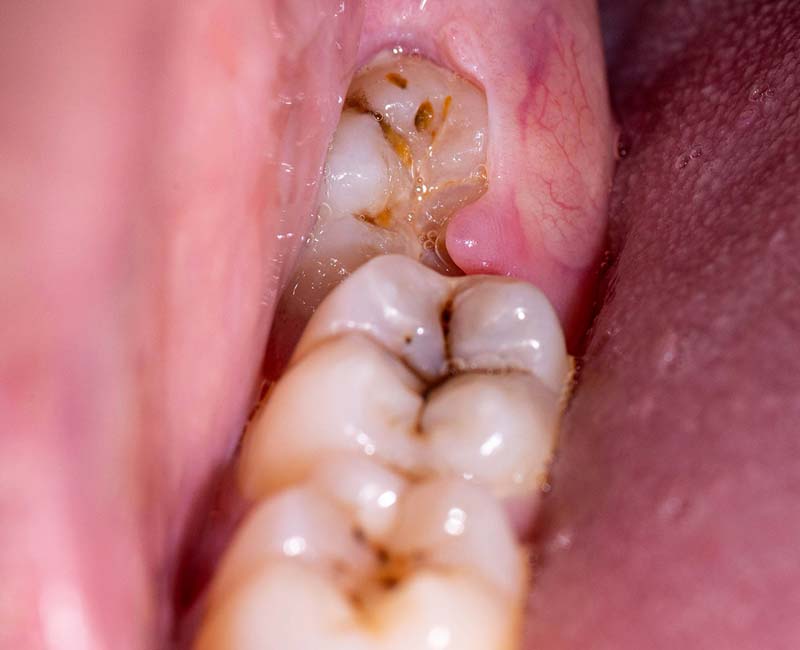If you’re experiencing discomfort around your wisdom teeth, it could be a sign of a cavity. Wisdom teeth are often the last to erupt in the mouth, and their placement makes them vulnerable to cavities. However, understanding the causes, symptoms, and treatment options can help manage this issue and ensure better oral health.
What is a Wisdom Tooth Cavity?
A wisdom tooth cavity is simply a hole or decayed area that forms in one of your third molars (the “wisdom teeth”). These teeth, located at the back of your mouth, are often more prone to cavities due to their position and how difficult they can be to clean. The cavity itself is caused by a breakdown of tooth enamel due to bacterial acids, plaque, or food particles that get trapped.

Symptoms of a Wisdom Tooth Cavity:
If you have a cavity in your wisdom tooth, you may experience the following symptoms:
- Pain in the back of your mouth: This is one of the most obvious signs. The pain might come and go, or it could be persistent.
- Swelling or tenderness around the gum: Red, inflamed gums near the wisdom tooth can be a sign of infection.
- Sensitivity to hot or cold: You might feel discomfort when eating or drinking hot or cold foods and beverages.
- Bad breath: Cavities can lead to a buildup of bacteria, which may cause persistent bad breath.
Being aware of these signs early on can help you seek treatment before the cavity worsens.
Causes of Wisdom Tooth Cavities:
Understanding why wisdom teeth are more likely to get cavities starts with their position and function. Here are the most common causes:
- Difficult to clean: Wisdom teeth are located at the back of the mouth, making them harder to reach with a toothbrush. This allows plaque to build up.
- Misalignment: If your wisdom teeth grow at an angle, they may create pockets that trap food and bacteria.
- Partially erupted wisdom teeth: If a wisdom tooth hasn’t fully come through the gum line, bacteria can accumulate in the space between the tooth and the gum.
- Poor oral hygiene: Inadequate brushing and flossing allow plaque to form and lead to cavities.
Risks of Ignoring a Wisdom Tooth Cavity:
Ignoring a cavity in your wisdom tooth can lead to various dental complications, including:
- Infection: Bacteria can enter the cavity and cause an abscess, leading to severe pain and swelling.
- Damage to surrounding teeth: A large cavity may cause your neighboring teeth to become misaligned or affected.
- Gum disease: The untreated cavity may also result in gum irritation, bleeding, and infection, known as periodontal disease.
Thus, early intervention is key to preventing more severe consequences.
How to Prevent Wisdom Tooth Cavities:
Taking proactive steps to maintain oral hygiene can help reduce the risk of wisdom tooth cavities. Here are some effective strategies:
- Regular brushing and flossing: Brush your teeth at least twice a day and floss once to remove plaque from between your teeth, especially around the back.
- Use an antibacterial mouthwash: This can help reduce plaque buildup in hard-to-reach areas.
- Consider fluoride treatments: Fluoride strengthens tooth enamel, making it more resistant to decay.
- Visit your dentist regularly: Regular dental checkups and cleanings will help identify any problems early on.
Treatment Options for Wisdom Tooth Cavities:
If you do develop a cavity in your wisdom tooth, treatment options will vary depending on the severity of the decay.
Filling a Wisdom Tooth Cavity
When a cavity is small or moderate, a dental filling might be the best option. During this procedure, your dentist will clean out the decayed area and fill it with a durable material like composite resin, amalgam, or porcelain. Fillings can restore the structure and function of the tooth.
Root Canal for Wisdom Teeth
In more severe cases where the decay has reached the nerve of the tooth, a root canal may be necessary. During a root canal, the dentist removes the infected tissue, cleans the canal, and seals the tooth. This option is often used to save a tooth that might otherwise need to be extracted.
Wisdom Tooth Extraction
If the cavity is too severe or if the tooth is impacted or misaligned, your dentist may recommend extraction. Removing the tooth eliminates the source of the problem and prevents further complications.
Recovery After Wisdom Tooth Treatment:
After treatment for a wisdom tooth cavity, you’ll need time to recover. Here are some tips for a smooth recovery:
- Follow your dentist’s aftercare instructions: This may include avoiding hard foods, taking prescribed pain medications, and managing any swelling with ice packs.
- Rest: Allow yourself enough rest time to heal, especially after an extraction or root canal.
- Maintain oral hygiene: Be gentle when brushing your teeth around the treated area, and avoid disturbing the healing site.
FAQs on Wisdom Tooth Cavities:
Here are some frequently asked questions and answers to help clarify any remaining concerns:
- Can wisdom tooth cavities be prevented? Yes, with regular oral hygiene and proper dental care, you can minimize your risk.
- Do I need to remove my wisdom tooth if I have a cavity? Not always. Your dentist will assess the situation and recommend the best treatment, whether that’s a filling, root canal, or extraction.
- How do I know if I need my wisdom teeth removed? If your wisdom teeth are severely decayed, impacted, or causing pain, removal might be the best option.
- What happens if I ignore a cavity in my wisdom tooth? Ignoring the cavity can lead to serious issues such as infection, tooth damage, and gum disease.
- Are wisdom teeth more likely to get cavities than other teeth? Yes, due to their location and the difficulty of cleaning them properly, wisdom teeth are more prone to cavities.
- When can I recover after wisdom tooth extraction? Recovery typically takes a few days to a week, but full healing can take several weeks.
Conclusion
Understanding wisdom tooth cavities and the importance of early treatment can significantly reduce the risk of complications. Whether it’s through preventive measures or timely interventions, keeping your wisdom teeth healthy is essential to maintaining overall dental health. If you suspect a problem, don’t hesitate to contact your dentist for a thorough evaluation and personalized care plan.
Useful Resources:
10 Frequently Asked Questions About Wisdom Tooth Extraction
How Long to Keep Gauze in after Tooth Extraction
A List of 50 Soft Foods to Eat After Tooth Extraction
Managing the Worst Day of Pain after Wisdom Tooth Extraction



